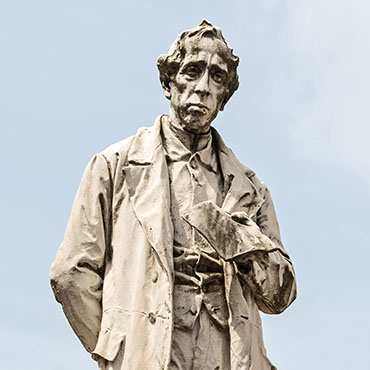Zanella was born at Chiampo, near Vicenza, in 1820. He attended the secondary school and then the seminary in Vicenza, combining classical studies with a natural interest in scientific progress. When he was not yet twenty years old, he began to publish translations and his own poetry; after he had taken his vows in 1843, he started his educational activities teaching Latin philology and philosophy to students at the secondary school. But the fact that his thoughts bore the stamp of Rosmini and Gioberti and his familiarity with an environment that was hostile to Austrian domination led to his dismissal in 1853. Although he was little involved in active politics, he contributed to the cause of Italian unity with literary works of a patriotic nature and with a commitment to teach the working classes, alongside his activity as a private tutor for the offspring of the high-ranking families of Vicenza, including Antonio Fogazzaro, with whom he established and maintained for ever a very close relationship.
He was readmitted to state education and, after a period at Venice and Vicenza, in 1862 he went to lead the Santo Stefano high school in Padua. This was a livelier city, culturally speaking, where he was able to get to know the major intellectuals of the time, strengthen friendships, like that with Antonio Fogazzaro, and make new ones, in particular with Fedele Lampertico and Luigi Luzzatti, with whom he was linked by a constant intense dialogue. After Veneto joined Italy, he moved to the University of Padua as a lecturer in Italian language and literature. In 1868 Barbèra the publishers issued Zanella’s first collection of poetical works, many of which were inspired by social themes, whereas some others were of scientific interest, such as Milton e Galileo, or the one that was still more well-known at the time, Sopra una conchiglia fossile nel mio studio, which had been written a few years earlier on the occasion of the wedding of Luigi Luzzatti. His verses, destined for great fame and severely antisocialist and anti-evolutionary, were inspired by a moderate liberal Catholicism and a conciliatory purpose between the pressures of the modernists and the immutable principles of the Catholic faith.
Despite his nomination as Chancellor of the University of Padua and the cordial and important meeting with Alessandro Manzoni, both in 1871, the loss of his mother and some fierce criticisms of his work plunged him to a long depression that culminated in his leaving the University in 1876. Freed from the obligations of teaching (apart from a less demanding post for Italian at the Istituto delle dame inglesi in Vicenza), he published a number of collections of his own verses (Astichello ed altre poesie, 1884), essays (Paralleli letterari, 1885) and translations of the poetry of others (Varie versioni poetiche, 1887). He also travelled for conferences and appearances at academic gatherings and spent much time in his house at Cavazzale in the countryside near Vicenza, where he died in 1888.
The importance of Giacomo Zanella in the intellectual biography of Antonio Favaro cannot be ignored. As a teacher in the high school of Padua at the time of his early training, as well as giving him a firm and lasting methodology also in literary subject that he would abandon at university, Zanella had a virtue that Favaro himself was anxious to stress, remembering him, together with a few others, at the Accademia della Crusca on the occasion of the publication of the last volume of the national edition: “It was our friend Giacomo Zanella, my unforgettable teacher, who was the first to place in my hands a writing of Galileo and to invite me to consider it”.


